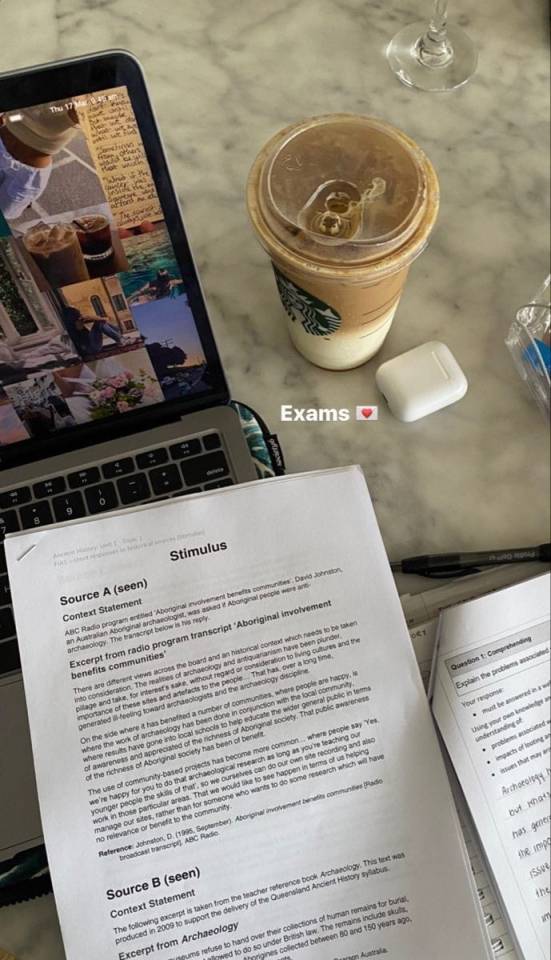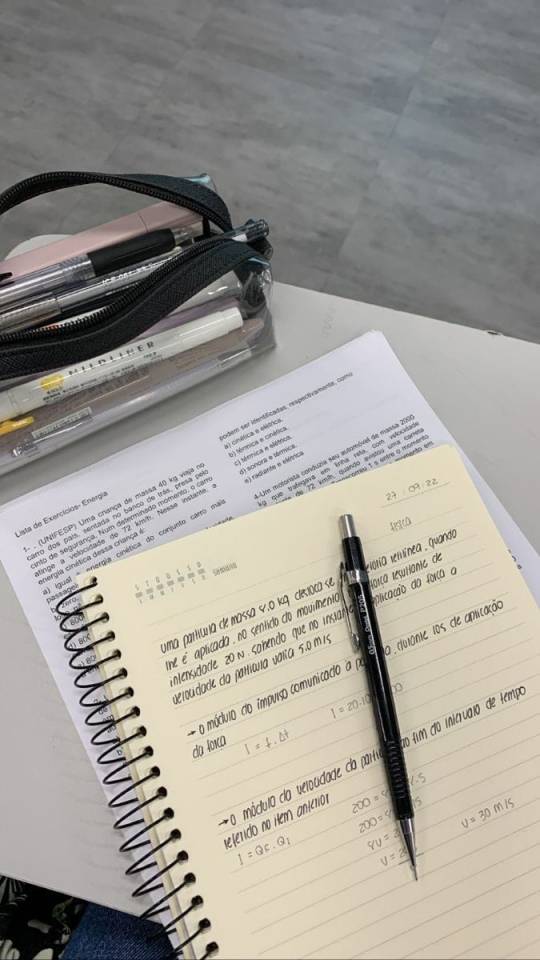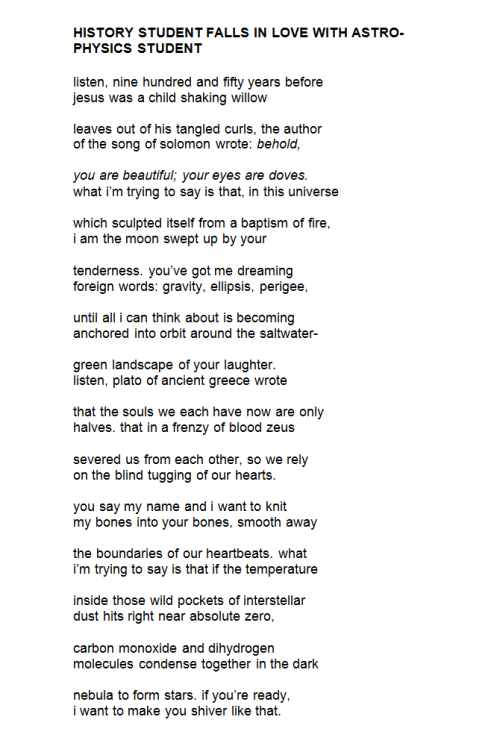One Of The Biggest Things I Can Advocate For (in Academia, But Also Just In Life) Is To Build Credibility
one of the biggest things I can advocate for (in academia, but also just in life) is to build credibility with yourself. It’s easy to fall into the habit of thinking of yourself as someone who does things last minute or who struggles to start tasks. people will tell you that you just need to build different habits, but I know for me at least the idea of ‘habit’ is sort of abstract and dehumanizing. Credibility is more like ‘I’ve done this before, so I know I can do it, and more importantly I trust myself to do it’. you set an assignment goal for the day and you meet it, and then you feel stronger setting one the next day. You establish a relationship with yourself that’s built on confidence and trust. That in turn starts to erode the barrier of insecurity and perfectionism and makes it easier to start and finish tasks. reframing the narrative as a process of building credibility makes it easier to celebrate each step and recognize how strong your relationship with yourself can become
More Posts from Edelweiss-study and Others



Being Classy and Developing a Ladylike Mindset
1. Cultivate Inner Confidence
Know Your Worth: Understand your strengths and embrace your individuality. Confidence shines through when you’re comfortable with who you are.
Positive Self-Talk: Replace self-doubt with affirmations and focus on your achievements.
Stay Humble: Confidence paired with humility creates a balanced and approachable demeanor.
2. Refine Your Communication Skills
Speak Eloquently: Practice speaking clearly and thoughtfully. Avoid excessive slang or profanity.
Listen Actively: Pay attention when others speak, showing genuine interest.
Express Gratitude: Use “please,” “thank you,” and “excuse me” generously.
Avoid Gossip: Discuss ideas and experiences rather than people’s flaws.
3. Embrace Elegance in Appearance
Dress Tastefully: Choose clothing that flatters your body and suits the occasion. Stick to timeless pieces and neutral tones for a polished look.
Maintain Grooming: Keep your hair, nails, and skin clean and neat. A simple, natural makeup look often appears more refined.
Invest in Quality Accessories: A classic handbag, elegant jewelry, and well-maintained shoes elevate your style.
4. Develop a Graceful Demeanor
Practice Good Posture: Stand and sit up straight; it conveys poise and confidence.
Move Gracefully: Walk with intention and avoid rushing or slouching.
Control Your Emotions: Stay calm under pressure and express emotions in a balanced manner.
Be Mindful: Avoid interrupting, fidgeting, or speaking too loudly in social settings.
5. Educate Yourself Continuously
Pursue Knowledge: Stay informed about current events, culture, and areas of personal interest.
Read Widely: Literature, history, and self-development books broaden your perspective.
Learn New Skills: Cooking, etiquette, or a second language can enhance your personal refinement.
6. Uphold Strong Values
Integrity: Stay true to your values and act with honesty.
Kindness: Treat everyone with respect and compassion, regardless of status.
Accountability: Take responsibility for your actions and learn from mistakes.
Boundaries: Maintain healthy boundaries in relationships and stand up for yourself gracefully.
7. Practice Good Etiquette
Table Manners: Familiarize yourself with basic dining etiquette.
Social Etiquette: Be polite in conversation, respect personal space, and use appropriate body language.
Digital Etiquette: Avoid oversharing online and be mindful of how you communicate on social media.
8. Surround Yourself with Positivity
Choose Your Circle Wisely: Surround yourself with people who inspire and uplift you.
Seek Inspiration: Follow role models who embody elegance and class.
Avoid Drama: Distance yourself from negativity and unnecessary conflicts.
9. Give Back
Be Generous: Volunteer your time, resources, or skills to help others.
Show Appreciation: Acknowledge and thank those who contribute to your life.
10. Balance Ambition with Grace
Set Goals: Work toward personal and professional aspirations with determination.
Stay Humble: Celebrate your successes without arrogance.
Help Others Succeed: Offer encouragement and mentorship to those around you.
Being classy and having a ladylike mindset is about embodying grace, confidence, and kindness. It’s not just about appearance but also about your behavior, values, and the way you interact with the world.

study with me study date 08-03-23 human resource management, part 1 | part 2 | part 3 | part 4
study techniques the feynman technique question bank method of study 45:15 pomodoro ~ study technique flashcards español resources active recall for studying how does active recall work? eat the frog (time management) dual coding spaced repetition
notetaking the mapping method the boxing method the charting method the cornell method the sentence method the outlining method sketchnotes taking effective notes in class
study schedules five hour weekend study schedule six hour weekend study schedule
study guides learning languages study guide
balance in academia the importance of balance in academia school, extracurriculars and balance working as a student
study skills optimizing your study environment improving your memory time management in the ib how to improve your listening skills in lectures how to take better notes during fast-paced lectures how to improve memory retention in lectures
study advice & tips how to effectively organise flashcards study tips take more breaks while working regular review seeking support when needed and the benefit of tutoring miscellaneous study tips connecting your daily work to your goals healthy eating as a student healthy habits for straight a's how to boost your creativity creative routines the benefits of group studying the importance of study checklist for the new semester
university/college the university masterlist how to get into a good university applying to schools (what to consider) what can you do with a biology degree?
my research/explorations don't forget to do your research (artificial intelligence) pretty privilege in academia important qualities for students



don't study because you need to. study because knowledge is power. study because they can never take it away from you. study because you want to know more. study because it enhances you. study because it grows you.
INFJxENTP in literature

The Odyssey, Penelope and Odysseus, Tischbein, 1802
The canon INFJxENTP ship
One day you think: I want to die. And then you think, very quietly, actually I want a coffee. I want a nap. A sandwich. A book. And I want to die turns day by day into I want to go home, I want to walk in the woods, I want to see my friends, I want to sit in the sun. I want a cleaner room, I want a better job, I want to live somewhere else, I want to live.

History student falls in love with astrophysics student by Keaton St. James
(patreon)
[poem text: listen, nine hundred and fifty years before jesus was a child shaking willow leaves out of his tangled curls, the author of the song of solomon wrote: behold, you are beautiful; your eyes are doves.
what i’m trying to say is that, in this universe which sculpted itself from a baptism of fire, i am the moon swept up by your tenderness. you’ve got me dreaming foreign words: gravity, ellipsis, perigee, until all i can think about is becoming anchored into orbit around the saltwater-green landscape of your laughter.
listen, plato of ancient greece wrote that the souls we each have now are only halves. that in a frenzy of blood zeus severed us from each other, so we rely on the blind tugging of our hearts. you say my name and i want to knit my bones into your bones, smooth away the boundaries of our heartbeats.
what i’m trying to say is that if the temperature inside those wild pockets of interstellar dust hits right near absolute zero, carbon monoxide and dihydrogen molecules condense together in the dark nebula to form stars. if you’re ready, i want to make you shiver like that. /end poem text.]
Best language learning tips & masterlists from other bloggers I’ve come across
(these posts are not my own!)
THE HOLY GRAIL of language learning (-> seriously tho, this is the BEST thing I’ve ever come across)
Tips:
Some language learning exercises and tips
20 Favorite Language Learning Tips
what should you be reading to maximize your language learning?
tips for learning a language (things i wish i knew before i started)
language learning and langblr tips
Tips on how to read in your target language for longer periods of time
Tips and inspiration from Fluent in 3 months by Benny Lewis
Tips for learning a sign language
Tips for relearning your second first language
How to:
how to self teach a new language
learning a language: how to
learning languages and how to make it fun
how to study languages
how to practice speaking in a foreign language
how to learn a language when you don’t know where to start
how to make a schedule for language learning
How to keep track of learning more than one language at the same time
Masterposts:
Language Study Master Post
Swedish Resources Masterpost
French Resouces Masterpost
Italian Resources Masterpost
Resource List for Learning German
Challenges:
Language-Sanctuary Langblr Challenge
language learning checkerboard challenge
Word lists:
2+ months of language learning prompts
list of words you need to know in your target language, in 3 levels
Other stuff:
bullet journal dedicated to language learning
over 400 language related youtube channels in 50+ languages
TED talks about language (learning)
Learning the Alien Languages of Star Trek
.
Feel free to reblog and add your own lists / masterlists!

hi there! im a fan of your page 💕
can you give me the best studying techniques?
hi angel!! @mythicalmarion tysm for asking about study techniques 🤍 i'm so excited to share my secret methods that helped me maintain perfect grades while still having a dreamy lifestyle + time for self-care!! and thank you for being a fan of my blog, it means everything to me. <3
~ ♡ my non-basic study secrets that actually work ♡ ~




(don't mind the number formatting)
the neural bridging technique this is literally my favorite discovery!! instead of traditional note-taking, i create what i call "neural bridges" between different subjects. for example, when studying both literature + history, i connect historical events with the literature written during that time. i use a special notebook divided into sections where each page has two columns - one for each subject. the connections help you understand both subjects deeper + create stronger memory patterns!!
here's how i do it:
example:
left column: historical event
right column: literary connection
middle: draw connecting lines + add small insights
bottom: write how they influenced each other
the shadow expert method this changed everything for me!! i pretend i'm going to be interviewed as an expert on the topic i'm studying. i create potential interview questions + prepare detailed answers. but here's the twist - i record myself answering these questions in three different ways:
basic explanation (like i'm talking to a friend)
detailed analysis (like i'm teaching a class)
complex discussion (like i'm at a conference)
this forces you to understand the topic from multiple angles + helps you explain concepts in different ways!!
the reverse engineering study system instead of starting with the basics, i begin with the most complex example i can find and work backwards to understand the fundamentals. for example, in calculus, i start with a complicated equation + break it down into smaller parts until i reach the basic concepts.
my process looks like:
find the hardest example in the textbook
list every concept needed to understand it
create a concept map working backwards
study each component separately
rebuild the complex example step by step
the sensory anchoring technique this is seriously game-changing!! i associate different types of information with specific sensory experiences:
theoretical concepts - study while standing
factual information - sitting at my desk
problem-solving - walking slowly
memorization - gentle swaying
review - lying down
your body literally creates muscle memory associated with different types of learning!!
the metacognition mapping strategy i created this method where i track my understanding using what i call "clarity scores":
level 1: can recognize it
level 2: can explain it simply
level 3: can teach it
level 4: can apply it to new situations
level 5: can connect it to other topics
i keep a spreadsheet tracking my clarity levels for each topic + focus my study time on moving everything to level 5!!
the information architecture method instead of linear notes, i create what i call "knowledge buildings":
foundation: basic principles
first floor: key concepts
second floor: applications
top floor: advanced ideas
roof: real-world connections
each "floor" must be solid before moving up + i review from top to bottom weekly!!
the cognitive stamina training this is my absolute secret weapon!! i use a special interval system based on brain wave patterns:
32 minutes of focused study
8 minutes of active recall
16 minutes of teaching the material to my plushies
4 minutes of complete rest
the specific timing helps maintain peak mental performance + prevents study fatigue!!
the synthesis spiral evolution this method literally transformed how i retain information:
create main concept spirals
add branch spirals for subtopics
connect related concepts with colored lines
review by tracing the spiral paths
add new connections each study session
your notes evolve into a beautiful web of knowledge that grows with your understanding!!
these methods might seem different from typical study advice, but they're based on how our brains actually process + store information!! i developed these through lots of research + personal experimentation, and they've helped me maintain perfect grades while still having time for self-care, hobbies + fun!!
sending you the biggest hug + all my good study vibes!! remember that effective studying is about working with your brain, not against it <3
p.s. if you try any of these methods, please let me know how they work for you!! i love hearing about your study journeys!!
xoxo, mindy 🤍
glowettee hotline is still open, drop your dilemmas before the next advice post 💌: https://bit.ly/glowetteehotline

-
 spartacus89 liked this · 2 days ago
spartacus89 liked this · 2 days ago -
 meyoh liked this · 2 days ago
meyoh liked this · 2 days ago -
 m1ssrviol3t liked this · 2 days ago
m1ssrviol3t liked this · 2 days ago -
 swarsstudydiary reblogged this · 2 days ago
swarsstudydiary reblogged this · 2 days ago -
 lovelight-magic liked this · 2 days ago
lovelight-magic liked this · 2 days ago -
 coffeecodecoffee reblogged this · 2 days ago
coffeecodecoffee reblogged this · 2 days ago -
 bluepenstemon liked this · 3 days ago
bluepenstemon liked this · 3 days ago -
 johnnyfourballs liked this · 3 days ago
johnnyfourballs liked this · 3 days ago -
 lupercaz liked this · 3 days ago
lupercaz liked this · 3 days ago -
 rainforcsts liked this · 3 days ago
rainforcsts liked this · 3 days ago -
 rinweasley liked this · 3 days ago
rinweasley liked this · 3 days ago -
 soliloqi liked this · 3 days ago
soliloqi liked this · 3 days ago -
 balladofareader liked this · 3 days ago
balladofareader liked this · 3 days ago -
 caramelmiacchiato reblogged this · 3 days ago
caramelmiacchiato reblogged this · 3 days ago -
 caramelmiacchiato liked this · 3 days ago
caramelmiacchiato liked this · 3 days ago -
 paopuvanitas reblogged this · 3 days ago
paopuvanitas reblogged this · 3 days ago -
 fliztastic reblogged this · 3 days ago
fliztastic reblogged this · 3 days ago -
 fliztastic liked this · 3 days ago
fliztastic liked this · 3 days ago -
 melismasthmatic liked this · 3 days ago
melismasthmatic liked this · 3 days ago -
 tontonnot reblogged this · 3 days ago
tontonnot reblogged this · 3 days ago -
 tontonnot liked this · 3 days ago
tontonnot liked this · 3 days ago -
 cookiekitkat8484 liked this · 3 days ago
cookiekitkat8484 liked this · 3 days ago -
 fakekenedy liked this · 3 days ago
fakekenedy liked this · 3 days ago -
 robin-games liked this · 3 days ago
robin-games liked this · 3 days ago -
 probs-reading-fanfic liked this · 3 days ago
probs-reading-fanfic liked this · 3 days ago -
 nailaansari-xt-blog liked this · 3 days ago
nailaansari-xt-blog liked this · 3 days ago -
 mmnahhhh liked this · 3 days ago
mmnahhhh liked this · 3 days ago -
 aurosua liked this · 3 days ago
aurosua liked this · 3 days ago -
 doveisemily liked this · 3 days ago
doveisemily liked this · 3 days ago -
 ssupany liked this · 3 days ago
ssupany liked this · 3 days ago -
 mysticalmeddyxoxo liked this · 4 days ago
mysticalmeddyxoxo liked this · 4 days ago -
 urfavcoffeeaddict liked this · 4 days ago
urfavcoffeeaddict liked this · 4 days ago -
 ilyberrymuch liked this · 4 days ago
ilyberrymuch liked this · 4 days ago -
 paraselenewoman0 liked this · 4 days ago
paraselenewoman0 liked this · 4 days ago -
 venusruledmuse reblogged this · 4 days ago
venusruledmuse reblogged this · 4 days ago -
 study1ngandstarv1ng liked this · 4 days ago
study1ngandstarv1ng liked this · 4 days ago -
 lambcures liked this · 4 days ago
lambcures liked this · 4 days ago -
 diyaf26 liked this · 4 days ago
diyaf26 liked this · 4 days ago -
 sapphicmf2 liked this · 4 days ago
sapphicmf2 liked this · 4 days ago -
 seleneb1 reblogged this · 4 days ago
seleneb1 reblogged this · 4 days ago -
 chatoyervictoria liked this · 4 days ago
chatoyervictoria liked this · 4 days ago -
 meowiluvcats liked this · 4 days ago
meowiluvcats liked this · 4 days ago -
 catthebatcat reblogged this · 4 days ago
catthebatcat reblogged this · 4 days ago -
 thetipsysasquatch liked this · 4 days ago
thetipsysasquatch liked this · 4 days ago -
 catthebatcat liked this · 4 days ago
catthebatcat liked this · 4 days ago -
 thetipsysasquatch reblogged this · 4 days ago
thetipsysasquatch reblogged this · 4 days ago -
 auspicion liked this · 4 days ago
auspicion liked this · 4 days ago -
 niityyaaa liked this · 4 days ago
niityyaaa liked this · 4 days ago -
 circling-back-to-it-all liked this · 4 days ago
circling-back-to-it-all liked this · 4 days ago -
 anne-the-historian-ish reblogged this · 4 days ago
anne-the-historian-ish reblogged this · 4 days ago

